The Plextor M3 (256GB) Review
by Kristian Vättö on April 5, 2012 3:05 AM ESTRandom and Sequential Read/Write Speed
The four corners of SSD performance are as follows: random read, random write, sequential read and sequential write speed. Random accesses are generally small in size, while sequential accesses tend to be larger and thus we have the four Iometer tests we use in all of our reviews. Our first test writes 4KB in a completely random pattern over an 8GB space of the drive to simulate the sort of random access that you'd see on an OS drive (even this is more stressful than a normal desktop user would see). We perform three concurrent IOs and run the test for 3 minutes. The results reported are in average MB/s over the entire time. We use both standard pseudo randomly generated data for each write as well as fully random data to show you both the maximum and minimum performance offered by SandForce based drives in these tests. The average performance of SF drives will likely be somewhere in between the two values for each drive you see in the graphs. For an understanding of why this matters, read our original SandForce article.
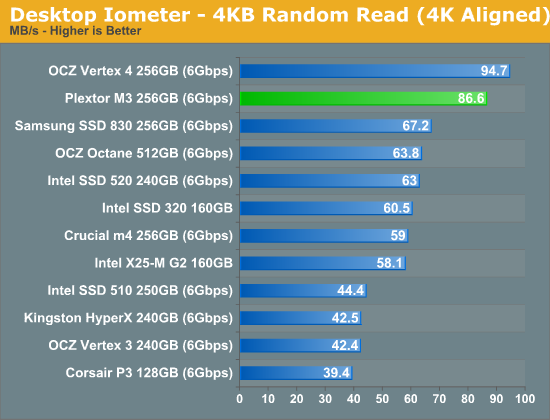
Plextor M3 provides very good 4KB random read performance. Looking at the Crucial m4 that uses the same Marvell controller, the Plextor M3 is 47% faster in random performance, so Plextor has clearly paid attention to their firmware.
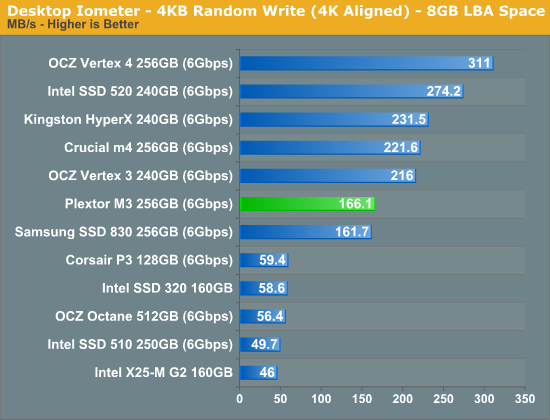
Random write performance is not as great as random read but still quite good enough for most workloads. This time Crucial's m4 comes out 33% faster than the M3, while the SF-2281 drives are all faster as well—write less data thanks to realtime compression and data deduplication techniques and your write speeds should generally be faster.
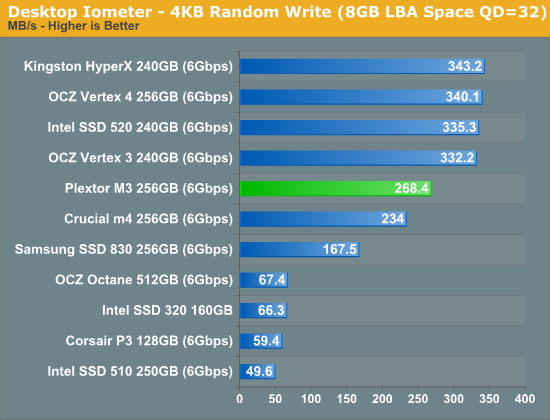
Switching the queue depth to 32 shows the difference between SandForce and non-SandForce quite well. SandForce is in its own class but among the Marvell SSDs, the Plextor M3 is the fastest. It's important to note that only heavy I/O workloads use queue depths that reach 32; most usage models don't go over 5.
Sequential Read/Write Speed
To measure sequential performance we ran a one minute long 128KB sequential test over the entire span of the drive at a queue depth of 1. The results reported are in average MB/s over the entire test length.
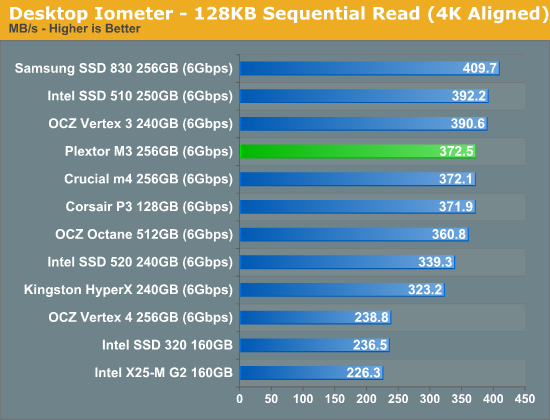
Sequential read speed is identical to Crucial m4 and Corsair P3, and good if not class leading for a SATA 6Gbps SSD.
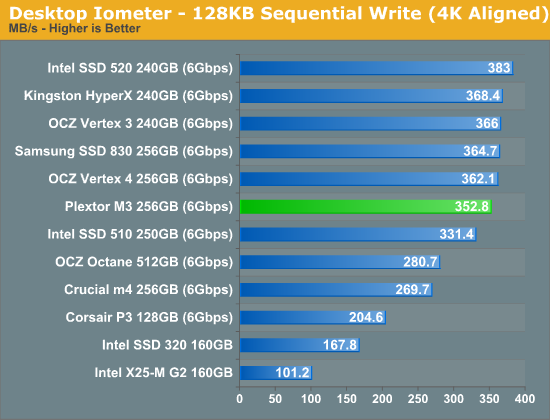
In sequential write speeds, the M3 is once again the fastest Marvell based SSD and is only a few percent behind SandForce based SSDs.










113 Comments
View All Comments
Kristian Vättö - Sunday, April 8, 2012 - link
Then the thanks should go to the man himself, aka Anand :-)wvh - Thursday, April 5, 2012 - link
We're not criticising him, just teaching him the smell of old farts.tnicks - Thursday, April 5, 2012 - link
Yep. I remember getting one of the first 2x burners back in the day from Plextor for ~$450 dollars. I still have nightmares of buffer underrun errors turning my $10/ea dollar blank cds into coasters.The0ne - Thursday, April 12, 2012 - link
Yep. Their products back then were high quality but came at a cost. To give an example, I tested and qualify Plextor CD/DVD drives for use in our system entirely despite the cost. That's how good and reliable they were.I am, however, shocked that the review started off about not knowing about the company though. Plextor has been around for ages with good products, although their presence has been little here in the US. I imagine most that don't know about the company would be young in age, very young.
Impulses - Thursday, April 5, 2012 - link
Will you guys be keeping this drive in a production system to see how it does long term?Kristian Vättö - Thursday, April 5, 2012 - link
I'm using it as a boot drive in my main system at the moment. So far so good.ac2 - Friday, April 6, 2012 - link
Kristian, you say correctly say "64GB and 128GB capacities are often the most popular capacities right now"And yet AT continues to persist with reviews of 200GB and up drives in almost all instances... It may be what the manufacturers are sending you but we expect better...
iwod - Thursday, April 5, 2012 - link
I thought there is a New Marvell controller coming out soon?Kristian Vättö - Thursday, April 5, 2012 - link
Marvell announced the 88SS9187 a couple of weeks ago but it will take a while before manufacturers release SSD based on it.bji - Thursday, April 5, 2012 - link
Marvell is right across the street from me. Well, across the highway anyway. When I ride my bike to work I go through their campus.A year or two ago I was thinking how exciting the SSD controller concept was; I thought that there must be lots of neat algorithmic tricks that can be played to hide the performance issues with block-erase flash memory and it sounded like a very intruiging problem to work on.
Too bad I didn't realize that Marvell would be working on SSD controllers (although I suspected they might). I should have popped across the highway and seen if I could get a job ... although, being a software developer with little experience in embedded controllers, it's unlikely they would have been interested.